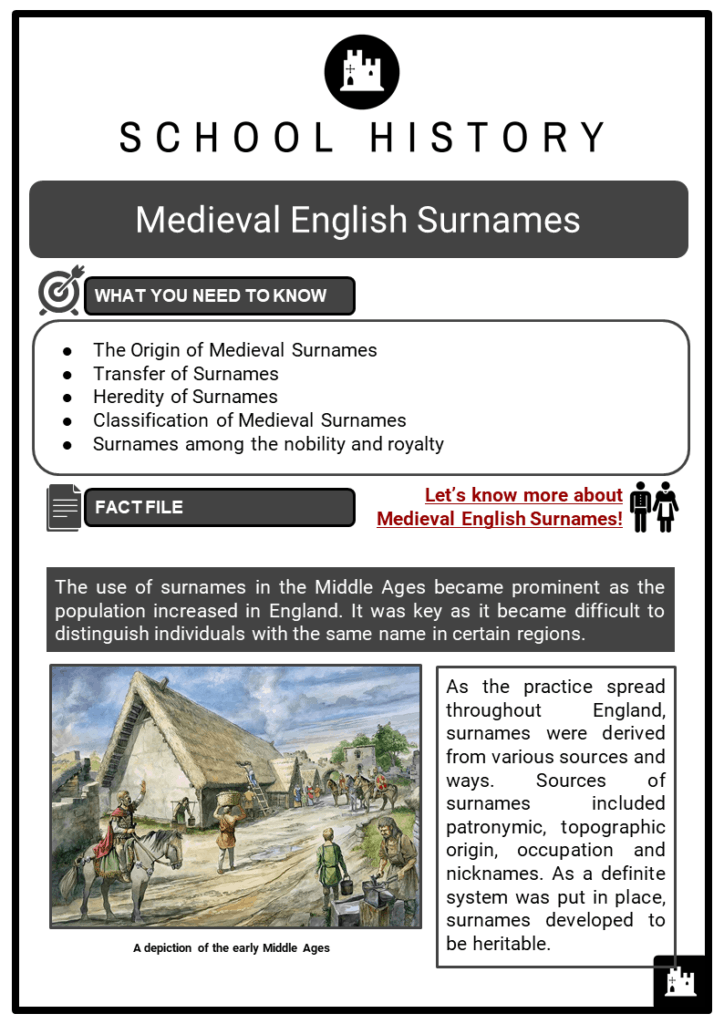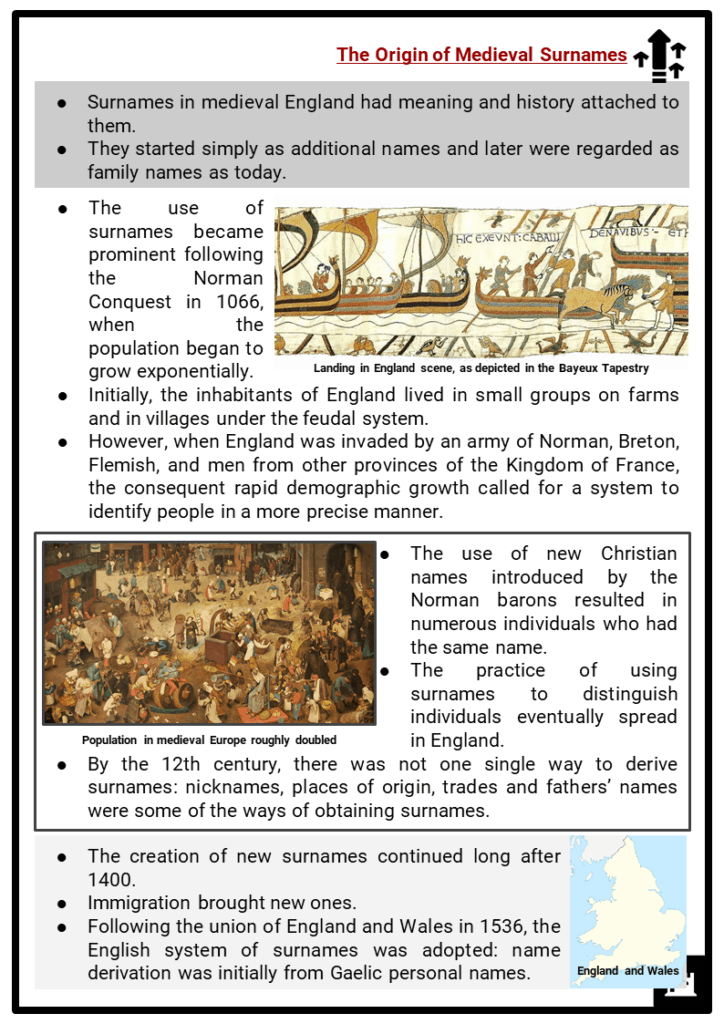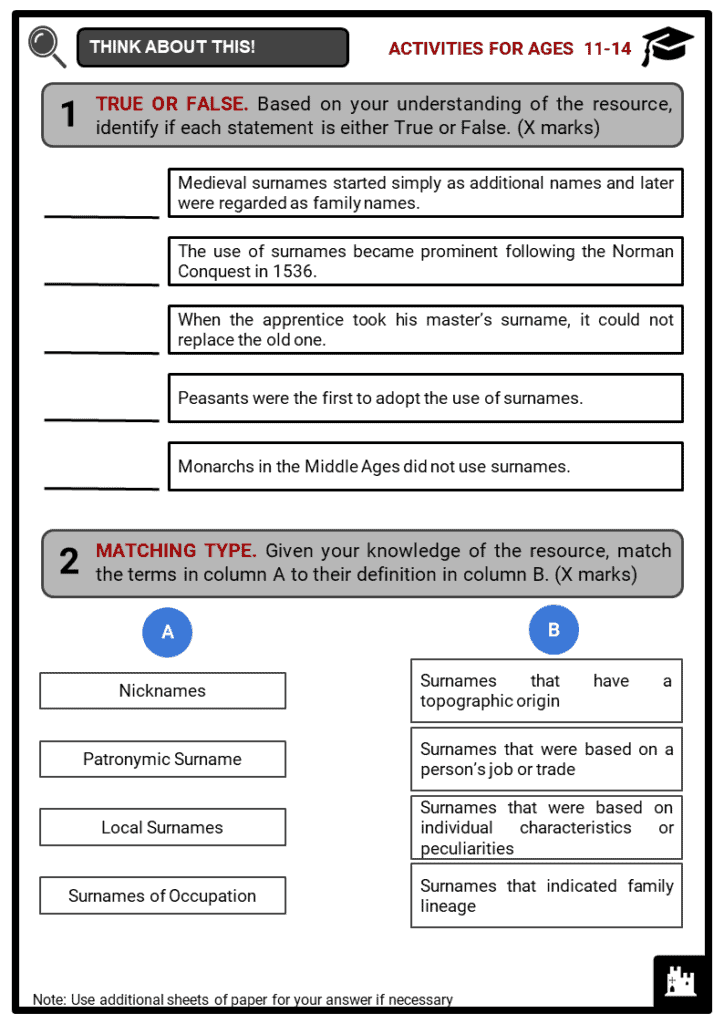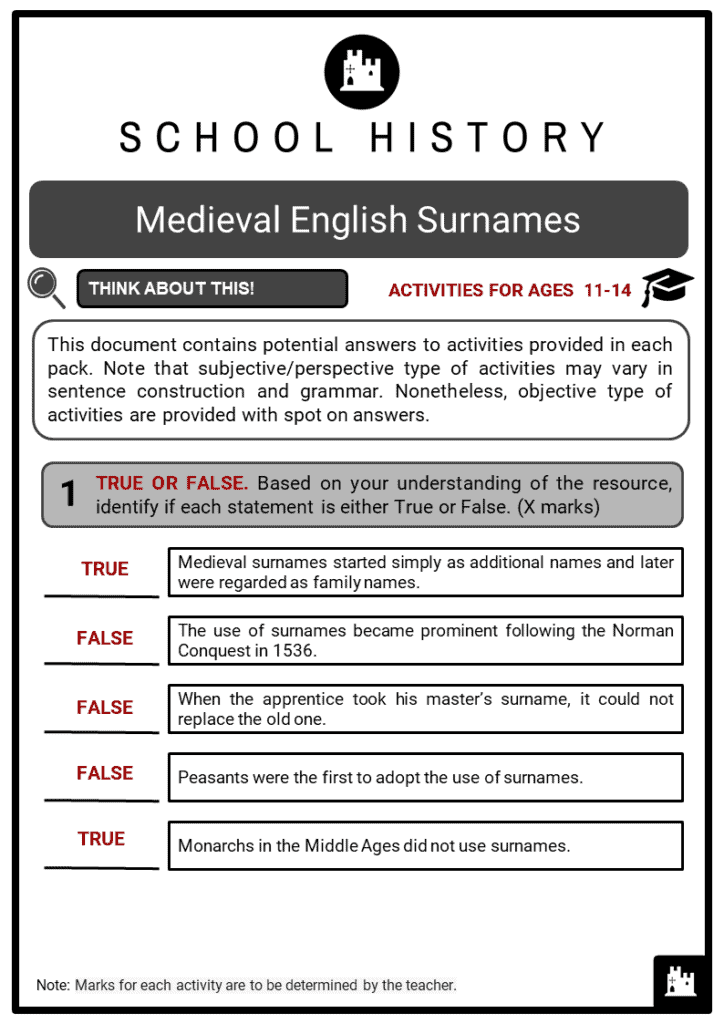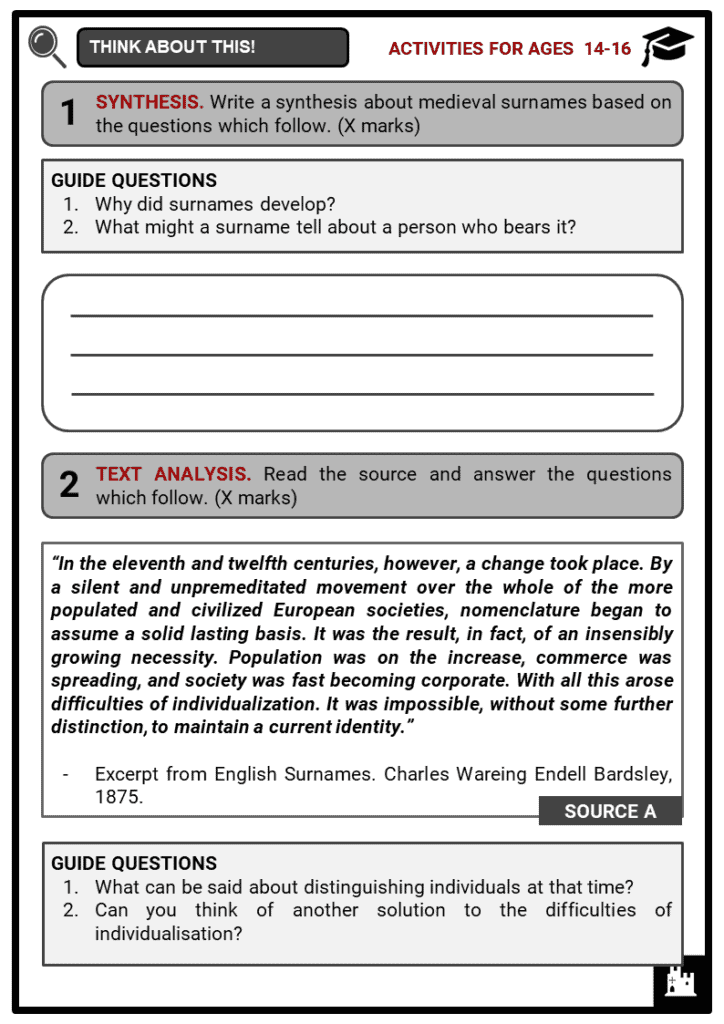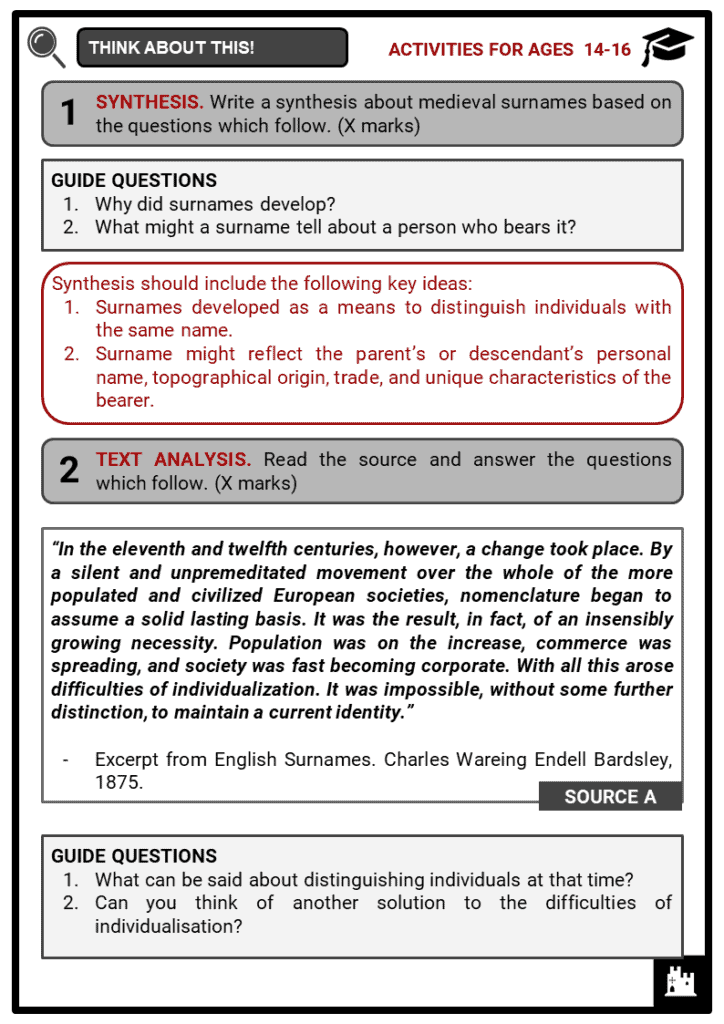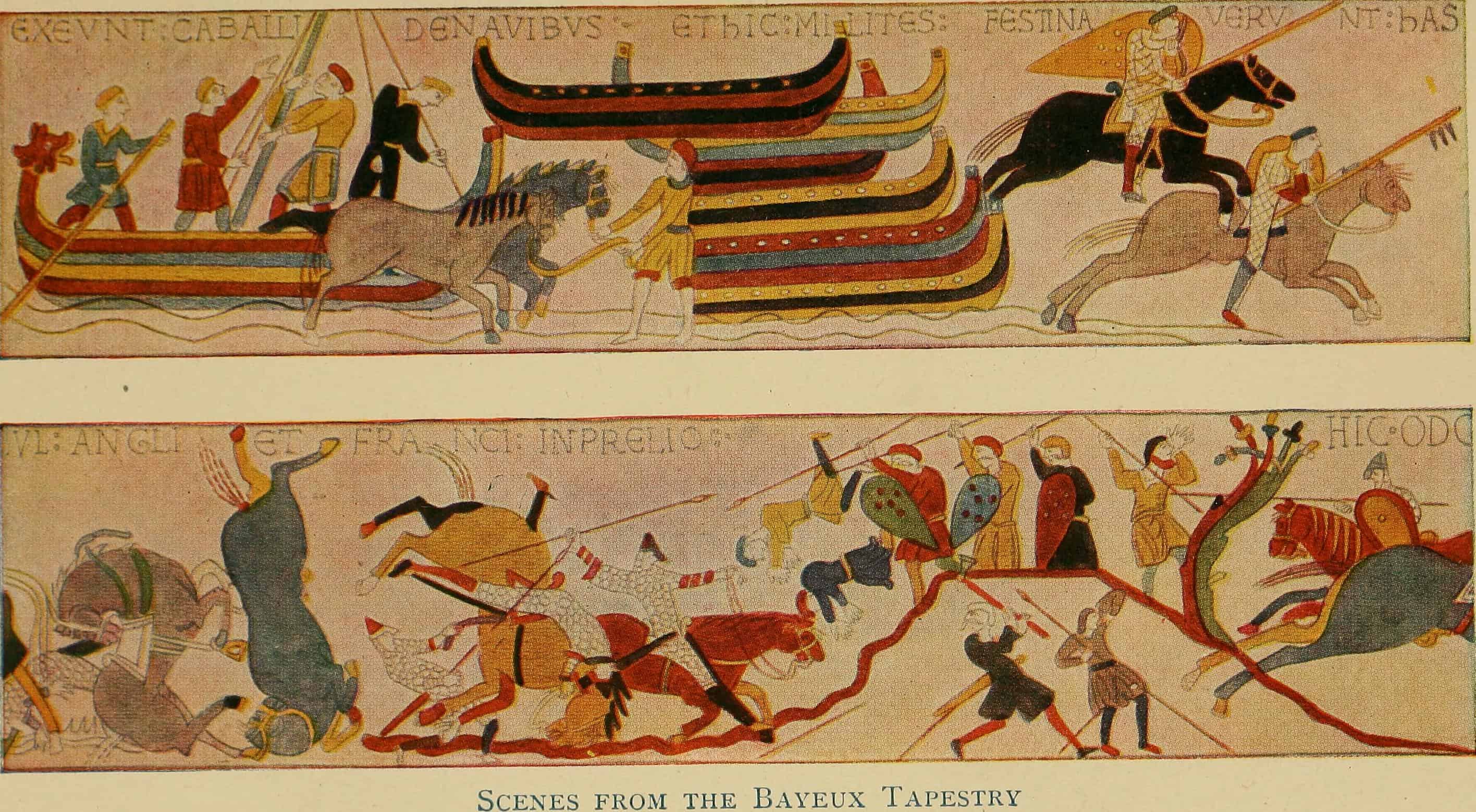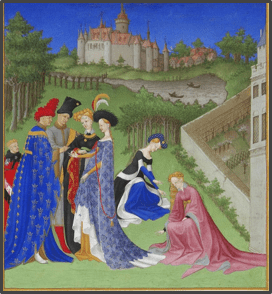Download Medieval English Surnames Worksheets
Do you want to save dozens of hours in time? Get your evenings and weekends back? Be able to teach Medieval English Surnames to your students?
Our worksheet bundle includes a fact file and printable worksheets and student activities. Perfect for both the classroom and homeschooling!
Table of Contents
Add a header to begin generating the table of contents
Summary
- The Origin of Medieval Surnames
- Transfer of Surnames
- Heredity of Surnames
- Classification of Medieval Surnames
- Surnames among the nobility and royalty
Key Facts And Information
Let’s know more about Medieval English Surnames!
- As the practice spread throughout England, surnames were derived from various sources and ways. Sources of surnames included patronymic, topographic origin, occupation and nicknames. As a definite system was put in place, surnames developed to be heritable.
The Origin of Medieval Surnames
- Surnames in medieval England had meaning and history attached to them.
- They started simply as additional names and later were regarded as family names as today.
- The use of surnames became prominent following the Norman Conquest in 1066, when the population began to grow exponentially.
- Initially, the inhabitants of England lived in small groups on farms and in villages under the feudal system.
- However, when England was invaded by an army of Norman, Breton, Flemish, and men from other provinces of the Kingdom of France, the consequent rapid demographic growth called for a system to identify people in a more precise manner.
- The use of new Christian names introduced by the Norman barons resulted in numerous individuals who had the same name.
- The practice of using surnames to distinguish individuals eventually spread in England.
- By the 12th century, there was not one single way to derive surnames: nicknames, places of origin, trades and fathers’ names were some of the ways of obtaining surnames.
- The creation of new surnames continued long after 1400.
- Immigration brought new ones.
- Following the union of England and Wales in 1536, the English system of surnames was adopted: name derivation was initially from Gaelic personal names.
Transfer of Surnames
- Aside from the different manners surnames were formed, guilds in the Middles Ages introduced another way to transfer surnames.
- The guilds system, that was based on apprenticeship, brought changes in how surnames developed.
- In the 13th and 14th centuries in London, it became a custom for the apprentice to use his master’s surname either temporarily or permanently.
- Once the apprentice took his master’s surname, it could replace the old one altogether.
- For example, Robert de Cavendish, son of Thomas atte Watre de Ewelle, late apprentice of Roger de Cavendish, mercer
Heredity of Surnames
- The rise of hereditary surnames was attributed to the Norman Conquest, when the Domesday Book was created.
- It was recorded that surnames were fixed among the nobility and upper classes in 12th century.
- Hereditary surnames gradually rose by the end of the 13th century whilst some did not take surnames in the lower classes.
- When the parish registers were introduced to the kingdom in 1538, a more definite idea of distribution of family name was obtained.
- These parish registers held records of baptisms, marriages and burials made by the Church: they contributed to surnames being hereditary in a way to record family history and genealogy.
- At the same time, it was still common to find a person baptised under one surname, married under another one, and then buried under a third.
Classification of Medieval Surnames
- The classification of surnames in the Middle Ages became extensive as various sources were used.
- Some of these surnames based on the following classifications are still popular today.
Patronymic surnames
- The most familiar surnames in the Middle Ages indicated family lineage.
- Patronymic is generally formed from the personal name of the father or mother, which can be baptismal or Christian names.
- Examples of Patronymic Surnames
- Anderson/Andrews – son of Andrew
- Atkinson/Atkins – son of Atkin (i.e. Adam)
- Bryson – son of Brice
- Danielson – son of Daniel
- Davis/Davies/Davidson – son of David
- Erickson – son of Erick
- Hughes – son of Hugh
- Jameson/Johnson – son of John
- Meredith – a person that descended from Maredudd (a sea lord)
- Morrison – son of Morris or of Moorish descent
- Robertson – son of Robert
- Simson – son of Simon
- Williamson – son of William
Local Surnames
- Surnames that have a topographic origin were probably the oldest and most common.
- Topographic origin can include country, town or estate – or features in the landscape such as hill, forest, or stream.
- Most of these names were obvious whilst some were obscure.
- Examples of Local Surnames
- Attaway – an individual that lives close to a road
- Bell – an individual that lives near a town bell
- Bridge – someone who lives by a bridge
- Forest – someone who lives by a forest
- Hill – someone who lives by a hill
- Knapp – someone who lives at the top of a hill
- Lancaster – a person who comes from Lancaster
- London – a person who comes from London
- Norton – a person who lives north of a town
- Park – someone who lives by a park
- Rose – a person who lives in an area where there are many roses
- Shaw – someone who lives by the woods
- Sommer – a person who lives in a sunny area
- Townsend – someone who lives on the outskirts of the town
- Tuft – someone who lives near many trees and bushes
- Tracey – an individual who comes from Tracy-sur-mer
- Yohe – an individual who lives near a stream
- York – a person who comes from York
Surnames of Occupation
- Other surnames were created from a person’s job or trade.
- Specific industries were favoured in certain districts which led to varying frequencies of occupational names in some areas.
- Furthermore, if a person changed his craft or trade, then his surname changed accordingly.
- Examples of Surnames of Occupation
- Abbey – someone that works in an abbey
- Arkwright – a person that makes arks
- Baker/Baxter – a bread maker
- Bauer – a peasant
- Bell – a bell-ringer
- Brewster – someone that works in a brewery
- Chamberlain – someone that looks after rooms and mansions
- Chandler – a candlemaker
- Chapman – an individual that sells products at the market or a shopkeeper
- Clarke – a teacher, a scholar, a secretary, or a priest
- Collier – a coal miner
- Cooper – someone that makes wooden buckets
- Dempster – a judge
- Fish/Fisher – a fisherman or a fish seller
- Gardner/Gardiner – a person that owns a garden or that cultivates flowers and vegetables
- Harper – an individual who either plays the harp or makes harps
- Inman – an innkeeper
- Jenner – a maker of military machines or engineer
- Kemp – a jouster
- Kitchener – a person that works in the kitchen
- Knight – a knight
- Koch/Kocher – a cook
- Lister – a dyer
- Miller – a person that works in a mill
- Packard – a person that sells illegal drugs or stolen goods
- Page – a young servant, an attendant
- Payne – a pagan
- Palmer – a pilgrim
- Parker – the keeper of the park
- Porter – the doorkeeper
- Rolfe – a peasant
- Ryder – a warrior
- Saylor – an acrobat or a dancer
- Scrivens – a writer, a clerk, or a scribe
- Sommer – a farmer that has to pay taxes in the summer
- Smith – a metal worker
- Spinner – a person that spins wool
- Steele – a person that works steel
- Stoddard – a horse keeper
- Swift – a messenger
- Taylor – a tailor
- Tinker – a person that mends kitchen utensils
- Toller – a person that collects taxes
- Wainwright – a person that makes carts
- Walter – a water bearer
- Ward – a guardian
- Webb – a weaver
Nicknames
- Nicknames were based on individual characteristics or peculiarities, which might be pleasant or unpleasant.
- Many medieval nicknames, especially the cruel ones, did not survive.
- This classification of surname was further divided into the following.
- Mental and Moral Peculiarities – These nicknames came from character traits and peculiarities of disposition which can either be complimentary or objectionable.
- Examples of Surnames based on Mental and Moral Peculiarities
- Aimar – a famous or noble individual
- Bigge – a big and strong individual
- Bennett – a blessed individual
- Blythe – happy or joyous
- Bonner – kind or courteous
- Bullard – someone that is deceitful
- Chance – a lucky person
- Curtis – an elegant person with good and courtly manners
- Dear – a person that is loved
- Devine – someone that behaved in a divine manner
- Daft – someone with a mild or meek character
- Everett – someone brave and strong
- Fish – a good swimmer
- Fox – a crafty person
- Grant – someone tall or great
- Hardy – bold, daring
- Hawk – someone with a fierce temper
- Hendman – a handsome or courteous person
- Keen – bold, brave
- Lightfoot – someone that walks rapidly
- Mannering – a manly person
- Moody – a bold and brave person
- Mundy – a person born on Monday
- Peacock – the nickname for a proud or arrogant person
- Power – a poor person
- Pratt – the nickname for a trickster or prankster
- Proude – a person that is vain or proud
- Pruitt – a brave and valiant individual
- Puttock – a greedy person
- Quick – the nickname for an agile person
- Rey – an individual who acts like a king
- Rose – a nickname for a person with a rosy complexion
- Russ – a person with red hair or a ruddy-complexion
- Selly – a blessed, happy, or lucky individual
- Sharp – a clever, smart person
- Short – a nickname for a person that was not tall
- Sommer – a cheerful person
- Sparks – a lively individual
- Spear – a nickname given to a thin person
- Stern – someone that is stern, harsh, or that has a severe character
- Swann/Swan – a nickname that was given to people known for their purity
- Sweet – a nickname for a sweet and pleasant person
- Tait – someone cheerful, happy
- Terrell – a stubborn individual
- Truman – a trustworthy person
- Wallace/Walsh – a Celt, or a foreigner, stranger
- Wild – wild, uncontrolled
- Physical and External Peculiarities – These nicknames came from physical attributes including condition, age, size, shape, capacity and complexion.
- Examples of Surnames based on Physical and External Peculiarities
- Black – someone with black or very dark hair
- Blanc – a person with blonde hair
- Brown/Browne – someone with dark coloured hair or skin
- Cameron – a person with a crooked nose
- Campbell – a person with a crooked mouth
- Cheeke – a person with a prominent jaw
- Cruikshank – a person with crooked legs
- Dunn – someone with dark coloured hair or skin
- Fox – an individual with red hair
- Grey – someone with grey hair or with grey clothes
- Kennedy – someone with an ugly head
- Morrell – a short person with a dark complexion
- Root – a person that is cheerful and happy
- Russell – a person with red hair
- Sullivan – a person with one eye or with very good eyesight
- Ware – a person that is astute or prudent
- Whitehead – a person with blonde hair
- Epithets - These are phrases expressing the quality or attributes of the person. Some prominent figures earned an epithet that remained in use long after their death. Some earned it posthumously. Epithets, like the nicknames, can be bizarre and unflattering.
- Examples of Epithets
- Knight: Epithet would be added to their first name such as the Brave, the Cowardly, the Strong, the Hardy.
- Monks: Epithet would be added to their first name such as the Blessed, the Holy, the Pious.
- Royalty: Epithet would be added to their first name such as the Great, the Kind, the Magnificent, the Martyr.
Surnames among the nobility and royalty
- Feudal nobility and gentry were the first to adopt the use of surnames.
- The Norman nobles who arrived in England differentiated themselves by affixing 'de' (of) before the name of their village in France.
- They eventually dropped the French derivations and used surnames based on their new English holdings.
- Their surnames thus indicated lordship and ownership of properties and estate.
- Whilst the nobles were among the first to practice the use of surnames, it was more common for them to use titles, which often changed.
- In essence, the nobles like dukes and earls tend to be known by their titles.
- Nobility titles were passed onto the heir, and most of them were not heritable by daughters.
- When the heir to an estate was not in the direct line, he would change his name to that of the original surname.
- Examples of Surnames of Noble Families:
- Arden
- Beauchamp
- Bigod
- Bohun
- Boleyn
- Cecil
- Courteney
- Dacre
- De Braose
- De Burgh
- De Clare
- De la Pole
- Monarchs in the Middle Ages did not use surnames.
- When they ascended the throne, they used their regnal names, which were usually their baptismal name.
Image sources:
[2.] http://www.medievalists.net/wp-content/uploads/2014/04/list-of-names.png

